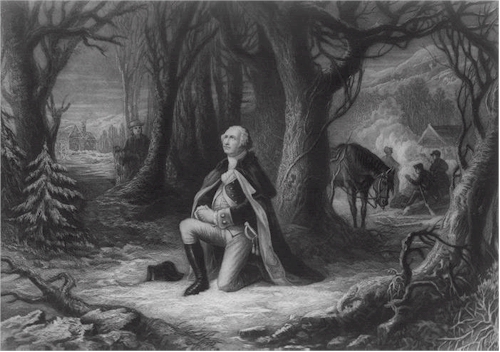|
|
|
Deism |
Deism is popularly associated with the religious attitudes of the Founding Fathers of the United States and with other leaders and thinkers of the Enlightenment.
Deism is not a religion in a formal or institutional sense. It never formed a church or denomination. The most compatible religious organizations today would be Unitarian-Universalists or Free-Thinkers associations.
Instead of a religion, deism is a philosophy or set of attitudes or ideas about religion associated with or deriving from the Scientific Revolution and the Enlightenment or Age of Reason.
Oxford English Dictionary. Deism. 1. The distinctive doctrine or belief of a deist; usually, belief in the existence of a Supreme Being as the source of finite existence, with rejection of revelation and the supernatural doctrines of Christianity; ‘natural religion’.
Deist. One who acknowledges the existence of a God upon the testimony of reason, but rejects revealed religion
Leading themes, ideas, or attitudes associated with Deism:
![]() De-emphasis of
the supernatural, miracles, or revelation (a famous example is Thomas
Jefferson's
The Life
and Morals of Jesus of Nazareth, a version of the Gospels that omits
Christ's miracles but retains his moral teachings)
De-emphasis of
the supernatural, miracles, or revelation (a famous example is Thomas
Jefferson's
The Life
and Morals of Jesus of Nazareth, a version of the Gospels that omits
Christ's miracles but retains his moral teachings)
![]() Emphasis
on "the book of Nature" as the Creation bearing witness to the wisdom and
supremacy of God, rather than scriptural revelation.
Emphasis
on "the book of Nature" as the Creation bearing witness to the wisdom and
supremacy of God, rather than scriptural revelation.
![]() God is not
addressed by name or personal attribute like "Jesus" or "God the Father" but by
lofty, depersonalized synonyms: "Providence,"
"The Governor of the Universe," "The Creator" (as in the
Declaration
of Independence)
God is not
addressed by name or personal attribute like "Jesus" or "God the Father" but by
lofty, depersonalized synonyms: "Providence,"
"The Governor of the Universe," "The Creator" (as in the
Declaration
of Independence)
Deism is repellent to orthodox or evangelical religion, but in light of the U.S. Constitution's prohibition on state religion, it has provided a vocabulary for speaking of God or the Divine that is somewhat universal or non-sectarian and so inclusive of all Americans regardless of specific belief systems.
Pay attention to how U.S. Presidents refer to God: "The Almighty," etc.; or recall John Kennedy's conclusion to his inaugural address: "With a good conscience our only sure reward, with history the final judge of our deeds, let us go forth to lead the land we love, asking His blessing and His help, but knowing that here on earth God's work must truly be our own."
Some synonyms
for this usage might include "the Almighty," "The Man Upstairs," or American
government usages like "the Supreme Governor of the World" in the first
constitution of the United States,
The Articles of
Confederation (XIII) or, from the opening to The Declaration of
Independence:
"When in the Course of human events, it becomes necessary for one people to dissolve the political bands which have connected them with another, and to assume among the powers of the earth, the separate and equal station to which the Laws of Nature and of Nature's God entitle them, a decent respect to the opinions of mankind requires that they should declare the causes which impel them to the separation.
"We hold these truths to be self-evident, that all men are created equal, that they are endowed by their Creator with certain unalienable Rights, that among these are Life, Liberty and the pursuit of Happiness."
World Union of Deists (who knew?)
Deism's appeal is largely limited to intellectuals or skeptical thinkers, but it endures as a "universal" form of religion that does not exclude different approaches to God. Making God vague or impersonal enables the concept to connect to various forms or traditions.
Average people enjoy religion not for intellectual appeal (though rarely is that completely absent) but for emotional comfort and community with like-minded people.
Intellectuals often try to style religion to their liking, and many find their own ways, but most of the successful religious writers and thinkers found ways to reach people's emotions and imaginations as well as their reason.
USA's Founding Fathers & Deism
The three "Founders" most associated with Deism are Thomas Paine, Benjamin Franklin, and Thomas Jefferson.
The "Founder" most associated with evangelical Christianity has been Samuel Adams, organizer of the Committees of Correspondence and the Boston Tea Party.
The figure of George Washington, the "father of our country," has been the most enigmatic and controversial for historians and popular culture. Popular art like the 1866 engraving below show Washington praying at Valley Forge, and some eyewitness accounts testify to his devotional practices, but his own writing and speech are largely silent concerning religion, and his attendance at religious services was occasional. However, simply because Washington gives so little to work with, anyone can make more or less of the evidence available.

Criticism of Deism by Blaise Pascal (1623-62), prodigious French mathemetician, physicist, inventor of an early computer, Christian philosopher, and author of Pensees (Thoughts):
"All who seek God apart from Jesus Christ, and who rest
in nature, either find no light to satisfy them, or form for themselves a means
of knowing God and serving him without a Mediator. Thus they fall into either
atheism or into deism, two things which the Christian religion almost equally
abhors. . . . The knowledge of God without that of our wretchedness creates
pride. The knowledge of our wretchedness without that of God creates despair.
The knowledge of Jesus Christ is the middle way, because in Him we find both God
and our wretchedness.
